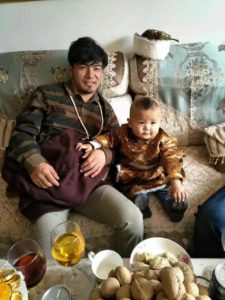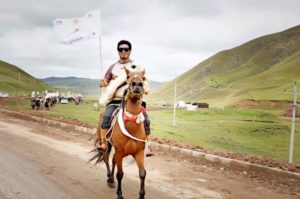
The Tibetan Centre for Human Rights and Democracy (TCHRD) has been informed by reliable sources that two Tibetans had been sentenced early last month on the charges of ‘inciting state subversion’ and ‘sharing state secrets’ in Tsekhog (Ch: Zeku) County, Malho (Ch: Huangnan) Tibetan Autonomous Prefecture, Qinghai Province, in the Tibetan province of Amdo.
Khando Tseten and Tsego were sentenced in connection with a song praising the Tibetan spiritual leader His Holiness the Dalai Lama. Tseten was imprisoned for seven years: five years for ‘inciting state subversion’ and two years for ‘sharing state secrets’. Tsego was given a three-year prison term. The vaguely worded crimes have been used to persecute and silence activists and human rights defenders in Tibet.
Last year, Tseten wrote the song that was then set to music and performed by a popular local dunglen artist Tsego. Both men were detained on 26 April 2019 from their hometown in Dokar and held in Thunring County.
An unidentified woman from Nagdong Village in Dokar Township had also been detained without trial for almost a year and released. She had shared the video of the song on various domestic online platforms.
Khando Tseten had been imprisoned earlier in December 2012 for taking part in student protests calling for Tibetan language freedom in Rebkong (Ch: Tongren) County. In November that year, thousands of Tibetan students had held several protests against China’s policy of violating Tibetan language rights. After his release in July 2014, he had been kept under strict surveillance with the local police imposing heavy restrictions on his movements and activities. His national ID card was cancelled making him ineligible for state welfare benefits. Since then, he had not been able to resume his schooling. He is now married and a father of a child.

No detail is available on Tseten’s charges and imprisonment in 2012. It appears that the heavy restrictions he faced following his release in 2014 are part of the “deprivation of political rights”, a supplementary sentence that individuals charged of national security crimes are required to serve after the expiration of their actual prison term outside prison. Articles 54 to 58 of the Chinese Criminal Law stipulate that individuals deprived of political rights lose their rights to freedom of speech, press, assembly, association, procession, and demonstration. In addition, the ‘Regulations for Monitoring and Management of Offenders Subject to Public Surveillance, Deprivation of Political Rights, Suspended Sentence, Parole, or Medical Parole by Public Security Organs’ provide specific restrictions on individuals deprived of political rights. The regulations require the local PSB authorities to monitor and surveil the individual concerned. The person placed under such surveillance is required to report periodically to the local PSB office and seek approval for travelling outside one’s place of residence.
TCHRD strongly condemns China’s continued persecution and oppression of Tibetans for merely exercising human rights and freedom of conscience. The sentencing of Khando Tseten and Tsego as well as detention without trial of the unidentified woman violate international human rights law and domestic law, both of which provide for the right to freedom of expression. By virtue of being party to various international human rights treaties, China has obligations and duties under international law to respect, protect and fulfill human rights.
TCHRD calls for the immediate and unconditional release of Tseten and Tsego from illegal imprisonment and restoration of their human rights from immediate effect. Chinese authorities must initiate an impartial investigation into the illegalities surrounding the detention of all three Tibetans including the unidentified woman and the guilty officials must be penalized.
